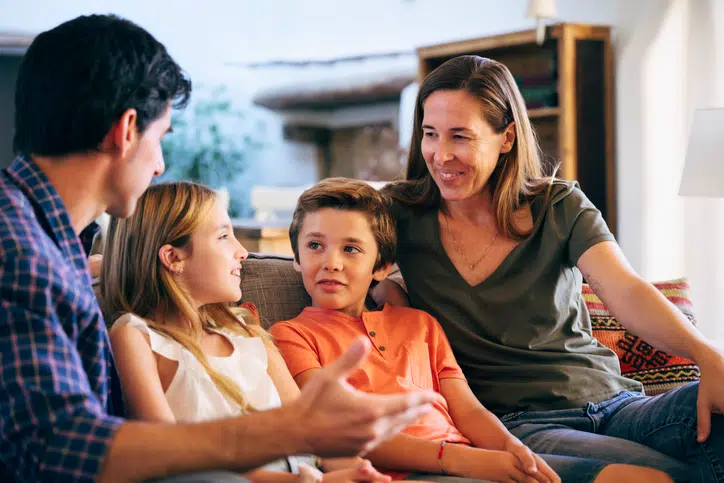What a happy, life-altering, exhausting, and intimidating thing it is to be a parent of small children. I am the father of three children under the age of 12.
There have been moments of undeniable joy, such as watching my oldest daughter take her first steps. There have been many opportunities for laughter, such as when my son bit into a lemon for the first time. There is also exhaustion. Ray Romano put it well when he said, “Everyone should have kids. They are the greatest joy in the world. But they are also terrorists. You’ll realize this as soon as they are born, and they start using sleep deprivation to break you.”
And then, on top of all of this happiness, laughter, and exhaustion, there is the intimidation factor. Who among us—in the realm of small-child-parentdom—hasn’t recognized the pressure involved in being a role model for our young children?
That’s right. Children are receptive. They are like little sponges ready to absorb what we teach them. They stand ready each day to receive in their memory banks the deposits we will make. Their receptivity is something upon which we should capitalize, and some of the most ordinary or regular moments in the parenting calendar provide a great opportunity to do so.
So, how can parents capitalize on the learning opportunity provided by the 2020 election? Even the youngest elementary school children repeatedly hear the name of our nation’s top political leaders. Like everybody else in our country, they hear positive and negative opinions expressed about political leaders and issues.
So, how can we best talk about politics with our children?
One thing we can teach them is that politics is something put in place by God. Just like God created many “kinds” of animals, he also created many kinds of human activities, such as art, science, business, education, and politics. Each type of human activity has its own purpose in God’s good world.
A second thing we can teach them is that God wants our political activity to contribute to the well-being of our communities, states, and nation. When we discuss and debate political issues, we do so because we want to make our world a better and safer place.
A third thing we can do is show them how to be positively involved in politics. We can discuss domestic political issues and foreign policies with them explaining why we hold certain viewpoints. We can discuss why we make it a priority to vote.
A fourth thing we can do is to help our children see that not only our views but also our attitudes and postures matter to God. In politics, as in any other realm of culture, we should display tact, moderation, and good manners even when disagreeing firmly with people on the other side of the political “aisle.”
A fifth thing we can do is set aside a specific time when we are likely to talk about important matters. For my family, that time is dinner. Research reveals that dinner time conversation is immensely profitable for children. It boosts their vocabulary, improves their school grades, makes them healthier, decreases their chances of clinical depression, and strengthens the bond with their parents and siblings. For that reason, it benefits families to have important conversations at the dinner table—conversations about God, friends, school, family, and…even politics.
Parents, don’t bypass the opportunity to talk with your children about matters of public significance. They are little sponges ready to soak up what you teach them. So, capitalize on their receptivity by talking with them about public matters. They will forever benefit from the deposits you make in their memory banks.
-Bruce Ashford
 Bruce Riley Ashford is Provost/Dean of the Faculty at Southeastern Baptist Theological Seminary, where he also serves as Professor of Theology and Culture. He is a Senior Fellow in Public Theology at the Kirby Laing Institute for Christian Ethics (Cambridge, U.K.) and a Research Fellow at the Ethics and Religious Liberty Commission. He is the coauthor of One Nation Under God: A Christian Hope for American Politics, author of Every Square Inch: An Introduction to Cultural Engagement for Christians, and a regular contributor to Fox News Opinion, the gospel Coalition, and The Daily Caller.
Bruce Riley Ashford is Provost/Dean of the Faculty at Southeastern Baptist Theological Seminary, where he also serves as Professor of Theology and Culture. He is a Senior Fellow in Public Theology at the Kirby Laing Institute for Christian Ethics (Cambridge, U.K.) and a Research Fellow at the Ethics and Religious Liberty Commission. He is the coauthor of One Nation Under God: A Christian Hope for American Politics, author of Every Square Inch: An Introduction to Cultural Engagement for Christians, and a regular contributor to Fox News Opinion, the gospel Coalition, and The Daily Caller.

















